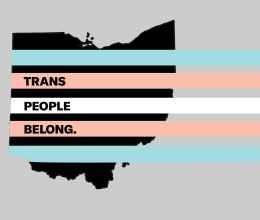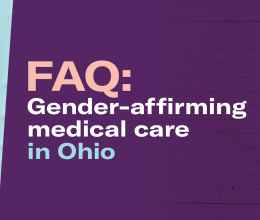Chair Gavarone, Vice Chair Callender, and members of the Joint Committee on Agency Rule Review, thank you for the opportunity to provide testimony today. My name is Sean McCann, and I serve as a Policy Strategist for the American Civil Liberties Union (ACLU) of Ohio. I am testifying today in opposition to Ohio Department of Health (ODH) proposed rule 3701-3-17. Accordingly, we urge JCARR to recommend the invalidation of this rule.
I will begin by identifying the JCARR prongs we believe the rule violates. Then, I will provide our justification for these arguments.
Firstly, ODH proposed rule 3701-3-17 both exceeds the scope of the agency’s statutory authority and conflicts with the legislative intent of the statute under which it is proposed. Additionally, the business impact analysis falls short of demonstrating that the regulatory intent of the rule justifies its adverse impact on businesses.
Proposed rule 3701-3-17’s cites Ohio Revised Code (ORC) section 3701.23 as providing statutory authority. Given that the plain language of the statute deals entirely with reporting contagious or infectious diseases, illnesses, health conditions, or unusual infectious agents or biological toxins, it is unclear how this statute can be used to justify regulations regarding gender dysphoria. 3701.23(B)(1-4) all name specific infectious diseases on which local health authorities must report information to ODH; (5) names “other contagious or infectious diseases, illnesses, health conditions, or unusual infectious agents or biological toxins posing a risk of human fatality or disability” as specified by the director of ODH. Clearly, gender dysphoria does not fall under any of those categories. For this reason, proposed rule 3701-3-17 violates the first JCARR prong by exceeding ODH’s statutory authority as granted by ORC 3701.23.
Further, ORC 3701.23 was enacted under Amended Substitute House Bill (HB) 6 of the 125th General Assembly, which modified the powers and duties of the Department of Health “relative to bioterrorism and other public health matters,” not relative to any general health condition. The law clearly was intended to address the preparedness of state and local public health authorities to respond to public health emergencies like epidemics, pandemics, mass casualties, and bioterrorism events. The incidence of gender dysphoria in individual patients does not fall under the purview of this statute. For this reason, 3701-3-17 also violates the second listed JCARR prong by conflicting with the legislative intent of the statute under which it was proposed.
Further, ODH’s business impact analysis does not adequately address the adverse impact of the proposed rule. ODH provided only surface-level detail on the amount of stakeholder engagement they conducted prior to drafting and revising their rules. In response to question 10 of the Common Sense Initiative’s (CSI’s) Business Impact Analysis, which asks what input stakeholders provided and how that input affected the draft regulation, ODH staff responded with the following: “ODH staff participated in meetings with hospitals and physicians providing care for gender-related conditions and with children (and their parents) who have received such care.” Staff responded to question 9, which asks the agency to list the stakeholders included in the development or review of the draft regulation, with “N/A.”
From these answers, it is impossible to get a complete picture of how ODH conducted stakeholder outreach and to what extent staff accounted for stakeholder feedback from a variety of providers’ perspectives, among other issues. For example, what works for a large hospital system might not work for a smaller health care facility that does not have the resources of the large hospital system. With that example in mind, we simply do not know whether all providers will be able to bear the burden and costs of these rules.
Additionally, while the rule at least attempts to protect patients’ privacy (arguably inadequately), that protection is not extended to providers. This, too, represents a significant adverse impact. Given the increasing politicization of gender-affirming care, we have serious concerns that, once this data is made available in the manner the rule prescribes, individuals who would seek to target providers for harassment (or worse) will be able to identify them. Patients, their families, and their providers must be able to make the decisions that are best for the patient’s health without fear that their personal information will be exposed and used in this way.
Thus, ODH failed to demonstrate clearly that the regulatory intent of the proposed regulations justifies the adverse impact on all impacted businesses.
Again, for these reasons, we urge this body to recommend that the Ohio General Assembly invalidate proposed rule 3701-3-17. At this time, I would be happy to address any questions committee members may have.







